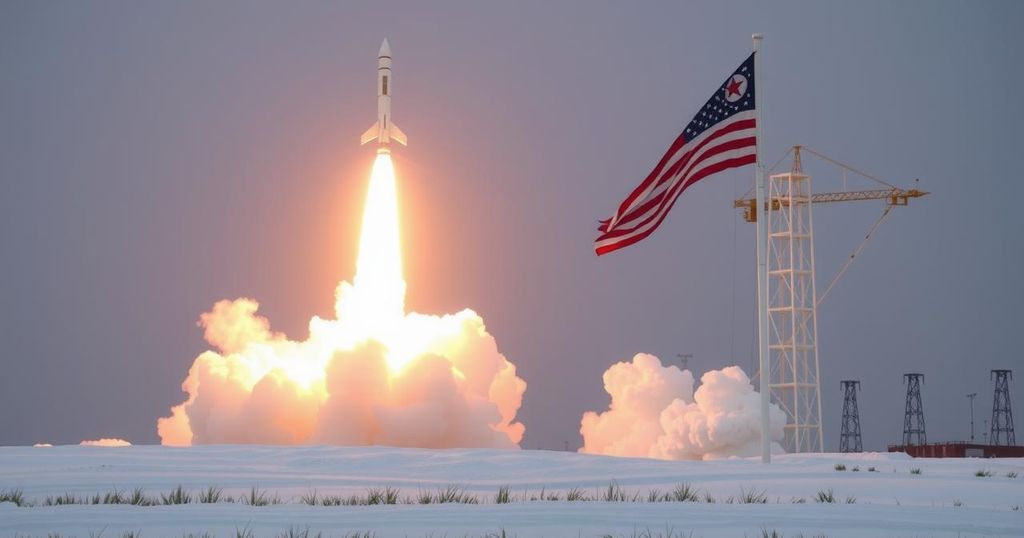World news
ASIA, BIDEN, BIDEN ADMINISTRATION, ENERGY INFRASTRUCTURE, EUROPE, EUROPE/ASIA, FOX, INTER-KOREAN RELATIONS, INTERNATIONAL RELATIONS, KCNA, KIM, KIM JONG - UN, KOREA, NORTH, MILITARY, NORTH KOREA, PYONGYANG, RUSSIA, SOUTH KOREA, TRUMP, UKRAINE, WAR, WORKERS ' PARTY OF KOREA, YOON, YOON SUK - YEOUL, YOON SUK YEOL
Amira Khan
0 Comments
North Korea Conducts Missile Test Amid Geopolitical Tensions
North Korea executed a ballistic missile test on Monday, marking its first since President Trump’s re-election. This act highlights Kim Jong Un’s disregard for improving relations with the U.S. and follows critical statements against U.S.-Japan-South Korea alliances. The test coincides with internal struggles in South Korea, as President Yoon Suk-Yeoul faced impeachment over a martial law declaration, drawing further rebuke from North Korea.
On Monday, North Korea conducted its first ballistic missile test since President-elect Donald Trump was re-elected. This marks a significant continuation of military activities by Kim Jong Un’s regime, with the previous missile test occurring on November 5, coinciding with the U.S. elections. Observers indicate that Kim has shown little inclination to foster a more amicable relationship with Trump when compared to his interactions with President Joe Biden.
The missile test followed an annual meeting of North Korea’s ruling Workers’ Party in Pyongyang, where state media reported that party leaders criticized the United States, Japan, and South Korea for forming a “nuclear military bloc.” The statement underscored North Korea’s strategies and intentions amid complex geopolitical tensions. Furthermore, this meeting occurred in the context of North Korea dispatching troops in support of Russia’s ongoing invasion of Ukraine, heightening tensions between Pyongyang and Western governments.
In response to increased hostilities, North Korea labeled South Korea an “anti-communist outpost,” particularly criticizing President Yoon Suk-Yeoul for his controversial declaration of martial law in December. The North remained largely silent after this declaration until making a pointed statement via its state-run news outlet, KCNA. In this report, North Korea described the martial law decree as a severe governance failure indicative of the vulnerabilities within South Korean society, suggesting that the regime was closely monitoring the unfolding political crisis.
The continued missile tests by North Korea signal an unwavering resolve from Kim Jong Un’s government, indicative of its callous pursuit of military objectives despite international pressure. As South Korea’s legislature moves to impeach President Yoon over the outbreak of martial law, it appears that the geopolitical situation in the region is fraught with uncertainty and potential volatility.
The article discusses the recent ballistic missile test conducted by North Korea, which represents an assertion of military capabilities amid heightened geopolitical tensions. Following the election of President Trump, North Korea’s actions suggest a refusal to engage in stronger diplomatic relations. The backdrop includes North Korea’s critical stance on U.S.-Japan-South Korea relations, its support of Russian military actions, and the internal political turmoil within South Korea, reflecting the complexities of international dynamics in the region. These developments are occurring against a broader narrative of North Korea’s consistent military posturing, particularly in light of Kim Jong Un’s ambitions and the regime’s criticism of its South Korean counterpart’s governance methods. The situation encapsulates the intricate balance of power and conflict in East Asia, especially as the involved parties navigate their alliances and rivalries.
In conclusion, North Korea’s recent missile test underscores the regime’s persistent military ambitions and indicates a reluctance to engage constructively with the United States under President Trump. The dismissal of South Korea’s governing actions, coupled with North Korea’s support for Russia’s military engagement in Ukraine, exemplifies the tensions within East Asia. As South Korea faces its internal political crisis, the international community remains vigilant regarding potential implications on regional stability and security.
Original Source: www.foxnews.com




Post Comment